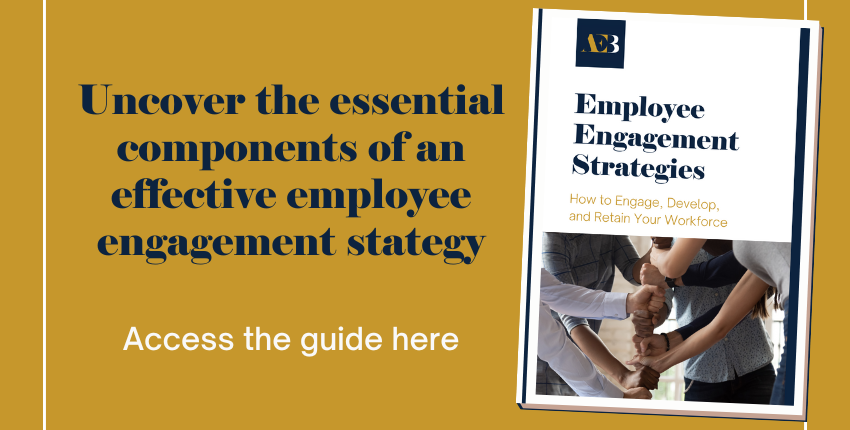If the perfect-fit hire for your available role is happy at their current company and not actively looking for a new opportunity, why would they leave their position to join your organization? The answer is actually less complicated than you might think, and can always be solved with a great employee value proposition.
We may be getting ahead of ourselves though, so ask yourself these questions:
-
Would they be swayed by a personal connection to your level of community involvement?
-
Are they excited about the way you recognize and reward achievers and provide opportunities for employees to grow and progress in their careers?
-
Have they heard amazing stories about your company culture and that your company is the place to work and grow your career?
-
Maybe it is the market-leading compensation package or creative perks you offer to your people?
The likelihood is that it’s not just one of these, but a combination of all of them. A combination referred to as the employee value proposition (EVP).
What is an Employee Value Proposition (EVP)?
An employee value proposition acts as a key driver of talent management and talent acquisition. It encompasses the main reasons that make people proud and motivated to work at an organization, such as an inspiring vision or a distinctive culture. When integrated into all aspects of a business, a strong EVP will help to both retain top performers and attract the best external talent.
The Society of HR Management (SHRM) gives this definition: “The EVP is a strategic statement that defines how a company wants to be perceived by its employees. It embodies the company’s values and ideals and is a fundamental step in defining an employer brand strategy for talent acquisition.”
In the simplest terms, an employee value proposition can be thought of as the value your employees gain from working at your organization rather than a competitor’s.
What an Employee Value Proposition is Not
Yet, for all that your employee value proposition can encompass, there are a few things that it is not. For starters, an EVP is not a rewording of your company mission and vision statements, or your core values, or even a code of ethics. Instead, it should be a reflection of how these aspects of your company are displayed in your organizational culture.
It’s also not a list of “creative perks” you might hear or read about at technology giants like nap pods, on-site laser tag, or flowing beer gardens. This should come as a relief as most organizations can never or would never offer these things. However, there is a reason that we know about what’s in those offices. They are uncommon and not easily attainable.
Of course, perks like these are nice, but many of those nap pods go unused, pool tables go unplayed, catered lunches go uneaten, and employees don’t feel any happier than those without these perks. What most candidates and employees do crave is simply appreciation, recognition, and opportunity.
A 2013 study by Glassdoor revealed that more than eighty percent of employees say they’re motivated to work harder when their boss shows appreciation for their work. This can be as simple as a note, an unexpected treat, or a company-sponsored social event like a happy hour. Nap pods were not on the list. But has this changed nearly a decade later?
A 2021 workplace trends report by Dan Schawbel for LinkedIn revealed that employees are demanding more from their employers today, but still not more in the way of entertainment or creature comforts. Rather, employees are pushing companies to make a bigger difference in their communities and society at large and to provide more flexibility in work schedules, office facilities, and even broader health benefits.
What Value Does an EVP Provide to Employees and Job Candidates?
An employee value proposition establishes credibility with candidates and differentiates your employer brand to attract top talent – which is not easy in this market. Over the past few years, low unemployment levels combined with a growing number of job openings have pushed the supply and demand employment pendulum in clear favor of the candidate. Meaning that employers need to work harder than ever to attract quality talent and retain employees. An EVP is about defining the fundamental nature of your company; about what makes it unique and what it stands for.
It also re-energizes current employees. An EVP defines the give and get of the employer-employee relationship. This relationship is just like any other relationship; there is an ebb and a flow. An employee value proposition doesn’t just explain why someone joins a company; it reminds your employees why they stay.
How Can an EVP Benefit Your Organization?
Along with establishing perception and attracting top talent, creating and following a great employee value proposition can help you grow your business. Businesses can’t grow without a talented workforce in place. When you can find, attract, and retain the right talent, they will help boost your business and ultimately your company’s bottom line.
In an article for the American Management Association, industrial and organizational psychologist Dr. Bruce L. Katcher said his research showed measurable positive effects for organizations whose employees are proud to work there. Among these benefits are employees who feel more engaged, satisfied, and committed to their organization. This translates into employees more likely to recruit others to join them and who have longer tenure with their company. Dr. Katcher calls this collection of emotions and solidarity organizational pride.
Of course, your employee value proposition must be much more than a poetic combination of feel-good attributes and half-truths. An EVP needs to detail what value your current and prospective employees will gain by establishing and developing their careers with you versus anyone else, but especially over your competition.
How to Create Your EVP
Research is the key to beginning to craft any effective EVP statement. Remember your employee value proposition needs to convey values to be gained, define your unique characteristics, explain why new employees join you, and remind current employees why they stay.
Step 1: Do your research
Understanding that it’s not something defined by your C-suite, Board, or HR Team is paramount. The EVP should be about the core strengths of your organization inherently defined by your employees. This means finding out what is important to your employees.
Surveys and focus groups can help determine what aspects of your company culture are central to your employee value proposition. Many free online survey tools will allow employers to collect data anonymously, which is recommended for the most accurate information.
Since different attributes, benefits, and values will be important to different individuals, it’s important to review the full range of what you currently offer. (Note: ignore any temptation to ask about what you could or should offer employees, your employee value proposition is about what you have in place now.)
Areas to review, but not be limited to, should include:
-
Financial rewards: salaries, commissions, bonuses, stock options, investment/savings options, etc.
-
Employee benefits: health insurance, vacation/PTO plans, club/organization memberships, and any other benefits associated with the job
-
Career development: training, sponsored courses, mentorships, promotion opportunities, and special projects
-
Work environment: work-life balance, flexible hours/remote work opportunities, recognition, team-building efforts, communication systems and methods, office location, and workspace design
-
Company culture: trust, collaboration, interdepartmental relationships, organizational structure, team communication and support, alignment of employees and company goals
Step 2: Define your EVP
Review the information and feedback collected. What themes stand out? What comments and values are repeatedly mentioned? These points should be foundational to your final statement.
Here are a couple of tips to keep in mind when crafting your employee value proposition.
-
Convey a realistic representation of your company. This means that new employees should be able to confirm the way your talent acquisition team described your organization three to four months in. This is not the place to outline corporate goals.
-
Be reflective of the 5 areas you researched. While you don’t need to include details on everything, you do want to feature the areas mentioned most often in your research. It’s also important to give candidates the best possible perspective into your company.
-
Ensure it fits every area of your company. This is important for large organizations to get right, and for growing companies to take note of. Your EVP needs to inspire and instill pride in every employee, not just the area or department instrumental in creating your statement.
How to use your EVP
After the time and effort invested into creating the perfect employee value proposition for your unique company, how can and should you use it?
Since your primary use is to attract and engage prospective job candidates, your employee value proposition should be placed in prominent places for them to see it again and again along the recruiting journey. This would include the following for starters:
-
Add your EVP to your “About” page on your website and the profile sections of your social pages.
-
Make sure this is part of the role description for every job posting regardless of platform.
-
Train your recruiters (internal or external) to incorporate this into their conversation with candidates.
-
Include your EVP as part of your official offer letter.
-
Reinforce it again where possible during the entire onboarding process.
For your current employees, your employee value proposition should become a guidepost that ensures alignment between what is communicated and what is actually happening.
-
Review it during performance reviews for feedback on how it is measuring against your company culture.
-
Regularly send anonymous surveys to your staff with the same range of questions that you did for your initial research. Watch for changing values that could signal it’s time to update your EVP.
-
Conduct exit interviews when employees do leave your company to understand their changing perspectives.
Feeling stuck? Here are some examples.
“At Stripe, we’re looking for people with passion, grit, and integrity. You’re encouraged to apply even if your experience doesn’t precisely match the job description. Your skills and passion will stand out—and set you apart—especially if your career has taken some extraordinary twists and turns. At Stripe, we welcome diverse perspectives and people who think rigorously and aren’t afraid to challenge assumptions.”
Stripe
“We’re dedicated to building an inclusive culture where employees can do their best work. Feedback, research, and our own employees show that the number one way to do that is by being flexible. Giving HubSpotters the freedom and flexibility to create their own work-life balance builds trust in our company, but it’s also just the right thing to do. That’s why flexibility is at the core of our benefits and culture, from family planning to financial planning.”
HubSpot
“From empowering mentorships to customized coaching, PwC provides you with the support you need to help you develop your career. You’ll work with people from diverse backgrounds and industries to solve important problems. Are you ready to grow?”
PwC
If you don’t have an employee value proposition, or it has been some time since yours has been reviewed, invest in doing that soon. Your EVP is your promise to current and future employees in exchange for their commitment. That puts your brand’s reputation and trust on the line, and therefore well worth the effort to get right.
Learn how to engage with your employees by leveraging your employee value proposition and maintaining positive employee morale. Access the guide here.


.png)
.png)





